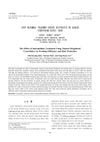 1 citations,
January 2024 in “Nature communications”
1 citations,
January 2024 in “Nature communications” Activating TLR5 in the gut can extend lifespan and improve health in aged mice.
 1 citations,
November 2014 in “Elsevier eBooks”
1 citations,
November 2014 in “Elsevier eBooks” Future research should focus on making bioengineered skin that completely restores all skin functions.

Mesenchymal stem cell-derived exosomes significantly increase hair density and thickness in androgenic alopecia patients.

The method creates realistic, anonymous acne face images for research, achieving 97.6% accuracy in classification.
 January 2023 in “International Journal of Clinical and Medical Education Research”
January 2023 in “International Journal of Clinical and Medical Education Research” Correct testosterone levels for age to treat prostate cancer, using low dose treatments as necessary.
 August 2021 in “Han'gug miyong haghoeji/Journal of the Korean society of cosmetology”
August 2021 in “Han'gug miyong haghoeji/Journal of the Korean society of cosmetology” Using natural polyphenol cross-linkers like tannic acid and green tea extract in perm treatments improves curling and protects hair.
 September 2019 in “Journal of Investigative Dermatology”
September 2019 in “Journal of Investigative Dermatology” People with pattern hair loss have higher polyamine levels in the top of their head compared to the back.
 September 2019 in “Journal of Investigative Dermatology”
September 2019 in “Journal of Investigative Dermatology” Targeted therapy with Ustekinumab significantly improved a skin condition called ILVEN, which is caused by mutations in the CARD14 gene.
 September 2019 in “Journal of Investigative Dermatology”
September 2019 in “Journal of Investigative Dermatology” Specialized ribosomes affect aging in human skin cells.
 January 2018 in “Elsevier eBooks”
January 2018 in “Elsevier eBooks” The document concludes that alopecia has significant social and psychological effects, leading to a market for hair loss treatments.
62 citations,
December 1941 in “Experimental biology and medicine” Eating phenylthiocarbamide made all the rats' hair go gray, but some returned to their original color after stopping.
 6 citations,
January 2012 in “Indian Journal of Endocrinology and Metabolism”
6 citations,
January 2012 in “Indian Journal of Endocrinology and Metabolism” Old drugs are often used for new, different medical purposes in endocrine pharmacology.
 31 citations,
August 2015 in “Stem Cells Translational Medicine”
31 citations,
August 2015 in “Stem Cells Translational Medicine” Human skin can provide stem cells for tissue repair and regeneration, but there are challenges in obtaining and growing these cells safely.
 29 citations,
December 2019 in “Transfusion and Apheresis Science”
29 citations,
December 2019 in “Transfusion and Apheresis Science” Platelet-derived bio-products help in wound healing and tissue regeneration but lack standardized methods, and their use in medicine is growing.
 25 citations,
December 2021 in “Stem Cell Research & Therapy”
25 citations,
December 2021 in “Stem Cell Research & Therapy” MSCs and their exosomes may speed up skin wound healing but need more research for consistent use.
24 citations,
August 2021 in “Biologics” Stem cell therapy shows promise in improving burn wound healing.
16 citations,
March 2021 in “Frontiers in cell and developmental biology” A new method using Y-27632 improves the growth and quality of human hair follicle stem cells for tissue engineering and therapy.
13 citations,
August 1991 in “The Journal of the American Osteopathic Association” 11 citations,
February 2019 in “Stem cells international” Skin-derived stem cells grow faster and are easier to obtain than hair follicle stem cells, but both can become various cell types.
 6 citations,
January 2015 in “Journal of regenerative medicine & tissue engineering”
6 citations,
January 2015 in “Journal of regenerative medicine & tissue engineering” The review concludes that innovations in regenerative medicine, tissue engineering, and developmental biology are essential for effective tissue repair and organ transplants.
 4 citations,
March 2023 in “Current Oncology”
4 citations,
March 2023 in “Current Oncology” Scalp cooling is the only FDA-approved method to prevent hair loss from chemotherapy, but other treatments like minoxidil and PRP are being tested.
3 citations,
August 2018 in “Stem cells international” Hair follicle cells help maintain and support stem cells and blood cell formation.
 2 citations,
May 2023 in “Frontiers in Bioengineering and Biotechnology”
2 citations,
May 2023 in “Frontiers in Bioengineering and Biotechnology” The document concludes that more research is needed on making and understanding biomaterial scaffolds for wound healing.
 2 citations,
March 2023 in “Biomedicine & pharmacotherapy”
2 citations,
March 2023 in “Biomedicine & pharmacotherapy” Platelet lysate effectively promotes hair growth and improves hair thickness in people with androgenetic alopecia.
 2 citations,
May 2021 in “Stem Cells International”
2 citations,
May 2021 in “Stem Cells International” Human pluripotent stem cells could be used to make platelets for medical use, but safety, effectiveness, and cost issues need to be resolved.
June 2024 in “Regenerative Therapy” Exosomes from stem cells may help rejuvenate skin and regrow hair, but more research is needed.
 May 2023 in “Frontiers in Cell and Developmental Biology”
May 2023 in “Frontiers in Cell and Developmental Biology” The document concludes that using stem cells to regenerate hair follicles could be a promising treatment for hair loss, but there are still challenges to overcome before it can be used clinically.
 May 2023 in “Materials research foundations”
May 2023 in “Materials research foundations” Nanomaterials like silver and gold can improve wound healing but need more research for safety.
 January 2023 in “Biomedicine & Pharmacotherapy”
January 2023 in “Biomedicine & Pharmacotherapy” Low oxygen conditions improve how well certain stem cells from embryos can make hair grow longer and faster.
 January 2023 in “Journal of Cosmetics, Dermatological Sciences and Applications”
January 2023 in “Journal of Cosmetics, Dermatological Sciences and Applications” The hair growth serum Trichosera® was effective in increasing hair regrowth and density and reducing hair fall without significant side effects.























